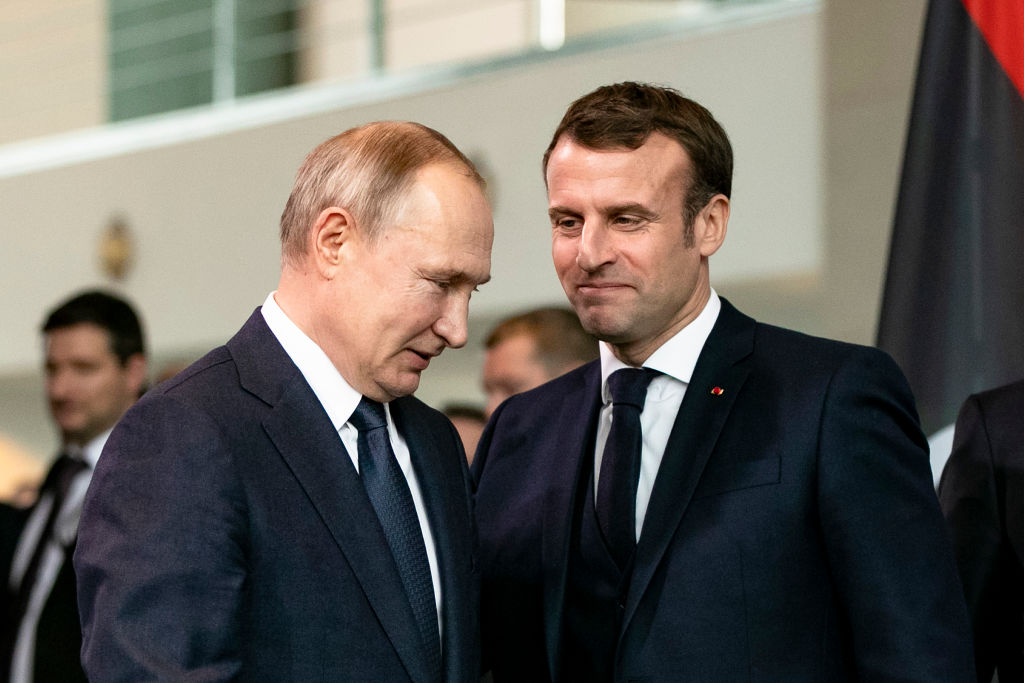French President Emmanuel Macron tends to rock the boat whenever he opens his mouth, saying hard truths that many of his European colleagues, both at the state level and in the European Union’s gargantuan bureaucracy, would rather be left unsaid. Examples are legion: his insistence in 2019 that Nato was going ‘brain-dead’; his proclamation in June 2022 that Russia shouldn’t be humiliated if Europe wants to preserve working relations with Moscow after the war ends; or his comments last April urging Europe to grow a backbone and refrain from blindly following the United States into a confrontation with China over Taiwan.
Should the thirst for justice override the possibility, however faint, of peace?
Macron’s May 31 speech at the Globsec conference in Bratislava, Slovakia, was designed in part to mitigate some of the chill his words have spread throughout the continent. On that score, Macron did well. He received a standing ovation in a part of Europe that is traditionally wary about France’s geopolitical intentions and can’t imagine French troops rushing to their defence in the event of Russian military action (not that such action is forthcoming anyway; it took Russia around ten months and 20,000 fatalities before the mid-sized Ukrainian city of Bakhmut was in its hands). Ukraine, Macron declared, is fighting not only for itself but also for Europe at large. Nato, he stated, was back with a vengeance courtesy of Russian President Vladimir Putin. And while past French presidents have talked down to eastern Europe as if they were inexperienced children, the France of today is willing to listen to their concerns.
All of this is relatively uncontroversial, and indeed welcomed, by the European political and security establishment. What may have come as a surprise, however, was Macron’s contention that justice for Ukraine and accountability for Russia may have to wait for the sake of peace. While everybody in Europe is rooting for a Ukrainian victory, there is a possibility that Russia’s defensive fortifications in the east and south could outlast the Ukrainian counteroffensive this summer. Exploring a diplomatic settlement to the conflict would therefore be, if not inevitable, then at least more plausible than it is today. The only problem: Russia won’t have an incentive to even discuss a settlement if a war crimes trial is around the corner.
While Macron’s comments were a bit muddled – it didn’t seem clear whether he was counselling dropping a trial option for Putin and other Russian officials entirely or just deferring one until a peace deal was achieved. But the Ukrainians are unlikely to appreciate his intervention regardless. In fact, these comments will rub a lot of people the wrong way. Given the scope of Russia’s actions in Ukraine, which include everything from the destruction of entire cities and the deportation of Ukrainian children to the atrocities committed in Bucha, there are strong feelings among Kyiv’s foreign backers about bringing Moscow’s crimes to light – both to penalise the perpetrators and to deter similar acts from would-be aggressors in the future. Establishing a special tribunal to prosecute Russian war crimes is one component of Ukrainian President Volodymyr Zelensky’s peace formula (which in reality is just a list of surrender terms Russia should comply with). Zelensky is backed up by the European Parliament, which voted overwhelmingly in January to call on the EU to work with Kyiv and the international community on creating a justice mechanism of sorts. US officials have expressed similar support; in March, the Biden administration’s ambassador-at-large for global criminal justice proposed an international tribunal to investigate the state crime of aggression.
All of the calls for justice are completely understandable. Putin, after all, was charged by the International Criminal Court two and a half months ago.
Yet Macron brings up a conversation that needs to be taken seriously because the conversation itself could become unavoidable depending on how the war unfolds. If there comes a serious opportunity for diplomacy between Ukraine and Russia on stopping or ending a war that has claimed tens of thousands of lives and resulted in millions of refugees, should the thirst for justice override the possibility, however faint, of peace? In other words, is sending the aggressor to a jail cell for the rest of their life worth the cost of a longer conflict and the likelihood of even more war crimes?
Some legal scholars and humanitarians will argue that the choice isn’t either/or. Ukraine, the logic goes, can have both peace and justice. The Ukrainians can win the war, cement the peace, and see their victimisers locked up for eternity.
Unfortunately, this is the very epitome of an ideal scenario. The world isn’t governed by the ideal but by the achievable – and short of an outright, unqualified military victory by the Ukrainian army that even the US intelligence community is doubtful of, the blunt reality is that Ukraine and Russia may have to swallow their pride as they negotiate a good-enough peace. It’s inconceivable that the Russians would agree to sign and implement a hypothetical peace agreement if some kind of immunity for past crimes wasn’t offered as a concession, at least for those at the very top. This would be a regrettable but unsurprising development if it came to pass – Putin isn’t exactly interested in negotiating the length of his own jail sentence.
Macron is clearly out front in thinking about the peace versus justice dilemma. If they haven’t already, it’s time others begin to think about it as well.






Comments